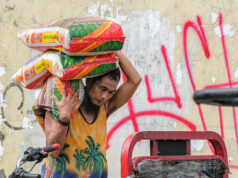Rules for distributing RCEF farm mechanization funds due soon
THE Philippine Center for Postharvest Development and Mechanization (PhilMech) said it will finalize after a key meeting this week the guidelines for funding the farm mechanization component of the Rice Competitiveness Enhancement Fund (RCEF).
“Magmi-meeting pa sa (There will be a meeting on) June 18. We’re just waiting for that then afterwards firmed up na ‘yung gagawin namin base doon sa (what we plan to do will be firmed up based on the) suggestions ng (of the) Program Streering Committee sa (at the) Department of Agriculture,” Rodolfo P. Estigoy, head of the applied communications division of PhilMech, told reporters.
“Ine-expect namin ‘yung pondo (We are expecting the fund) by end of June,” he said.
RCEF is funded by rice import tariffs that will be imposed on private-sector importers, who will be allowed to import the grain from selected Southeast Asian countries more freely. The importers also have the option to source grain from selected other countries but at a higher tariff.
The RCEF, worth about P10 billion a year, is authorized to allocate P5 billion for the mechanization of rice farms, P3 billion for high-yield rice seed, P1 billion to expand farm credit, and P1 billion to support agricultural extension and upgrade rice farmers’ planting knowhow.
The guidelines cover the identification of 1,200 beneficiary municipalities in 16 regions, which were further grouped into six clusters to facilitate the deployment of farm equipment over the next six years. Each of these municipalities are required to have farmer organizations with at least 100 hectares of irrigated rice land.
Major rice producing areas will be prioritized, including Cagayan Valley, Central Luzon, Central Visayas, and Soccsksargen.
He said the first phase of distribution involves land preparation equipment with harvesters to come later.
A full package for beneficiaries includes machinery for land preparation, crop establishment, harvesting and threshing, drying, and milling.
Initial distributions are expected by December.
Some P100 million has also been set aside for training on the use of the equipment and upgrading farmers’ skills.
At the end of six years, the cost of rice production is expected to drop because of the upgrades been reduced.
The cost of producing a kilo of palay, or unmilled rice is estimated at P12.72 per kilo, against the cost in Vietnam of about P6.22 and in Thailand of P8.86.
Meanwhile, Mr. Estigoy said that the Department of Budget and Management (DBM) also approved of an additional 59 staff in the PhilMech headcount, in the hope that new hires can be deployed to the regions by July. — Vincent Mariel P. Galang



